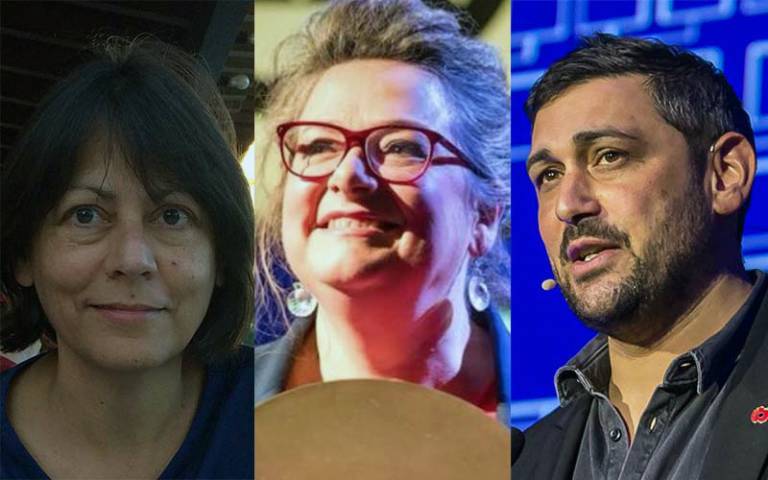UCL scientists recognised by the Royal Society
24 August 2021
Three UCL academics have received prestigious awards from the Royal Society, recognising their "exceptional research and contributions" to the world of science and helping to "expand our understanding of the world".

Professor Yvonne Rogers (UCL Computer Science) has been given the Royal Society’s Milner Award and Lecture for contributions to Human-Computer Interaction and the design of human-centred technology. The Milner is the premier European award for outstanding achievement in computer science.
Professor Sophie Scott CBE FBA FMedSci (UCL Psychology & Language Sciences) has been awarded the Michael Faraday Prize and Lecture for her work in engaging the public with neuroscience through events, talks, TV and radio, exemplifying how science communication can enhance scientific excellence.
Dr Adam Rutherford (UCL Biosciences) has received the David Attenborough Award and Lecture for his contribution to strengthening public confidence in science through radio, TV, films, talks and books, and in particular for challenging racist pseudoscience.
They join 23 other medal and award winners announced today, who are recognised for their work ranging from advancing quantum computing to revolutionising prenatal testing.
Commenting on her award, Professor Rogers said: “It is truly amazing to be recognised in this way and it makes me proud of what I have achieved throughout my career. It also sends out a strong message about the growing importance and significance of my field of Human-Computer Interaction, that investigates and designs technology to augment and empower human beings.”
Talking about the late Robin Milner, after whom the award was named, Professor Rogers continued: “If he was still alive today, I hope he would have approved of the way Computer Science has advanced of recent; being more inclusive, more interesting, more enjoyable and more diverse than ever before.”
Professor Scott said: 'I am delighted and very honoured to be awarded the Michael Faraday prize - I have always been inspired by Faraday's view that public engagement is a central aspect of scientific research, and I am lucky to have benefitted from UCL's proactive approach to public engagement."
Dr Rutherford said: "It's just an extraordinary honour. Attenborough was my gateway into a life-long love of evolution and genetics, as he was - and is - to so many scientists. That continued as an undergraduate at UCL and now as Fellow in the same department. I'm proud to be teaching the history of our field to undergraduates today and I can't wait for that to continue next term.”
In addition to the three academics honoured, UCL alumna Dame Jocelyn Bell Burnell DBE FRS was awarded the world’s oldest scientific prize, the Copley Medal. She is recognised for her work on the discovery of pulsars, one of the major astronomical advances of the 20th century.
Dame Jocelyn becomes the second woman to be awarded the Copley Medal, joining past winners including Charles Darwin, Albert Einstein and Dorothy Hodgkin Crowfoot.
Sir Adrian Smith, President of the Royal Society, said: “Through its medals and awards the Royal Society recognises those researchers and science communicators who have played a critical part in expanding our understanding of the world around us.
“From advancing vaccine development to catching the first glimpses of distant pulsars, these discoveries shape our societies, answer fundamental questions and open new avenues for exploration.
“On behalf of the Royal Society I congratulate each of our award winners and thank them for their work.”
Links
- Professor Yvonne Rogers’ academic profile
- Professor Sophie Scott’s academic profile
- Dr Adam Rutherford’s academic profile
- UCL Computer Science
- UCL Psychology & Language Sciences
- UCL Biosciences
- UCL Engineering
- UCL Brain Sciences
- UCL Life Sciences
- Dame Jocelyn Burnett Bell
- The Royal Society
Image
- L-R: Professor Yvonne Rogers, Professor Sophie Scott, Dr Adam Rutherford. Credit: UCL
Source
Media contact
Kate Corry
Tel: +44 (0)20 3108 6995
Email: k.corry [at] ucl.ac.uk
 Close
Close

